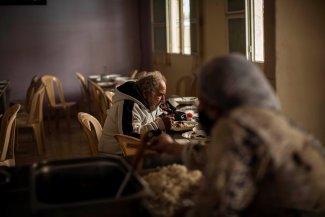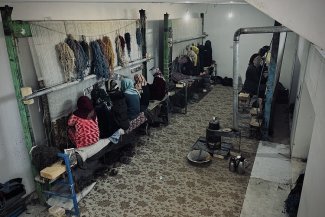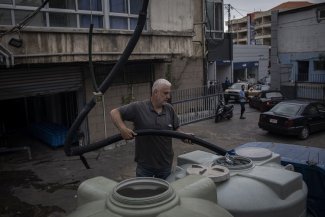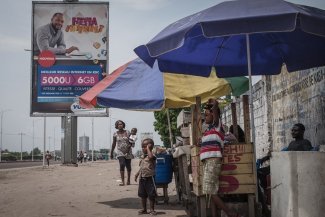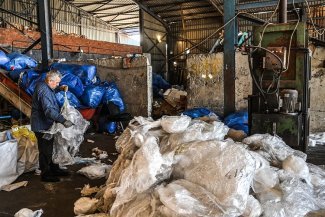
Both countries have one thing in common: the absence of social protection policies. This exacerbates social exclusion and poverty of the populations in both Lebanon and Afghanistan. In this image, women carry out their daily tasks in the Afghan capital, Kabul.
Helen Badr, 70, is one of many examples of how living conditions have deteriorated for Lebanese citizens. Like many of her neighbours, she cannot afford to pay the costly fees for a private electricity generator. As a result, she has no light in her home, as well as no drinking water, as electricity is required to pump water from the tank. Since Helen’s fridge is empty, she goes to a soup kitchen run by a charity for her meals. With the heavily indebted Lebanese government unable to provide vital social assistance, many of the country’s most vulnerable citizens rely on such charity kitchens to fill their stomachs.
Baz Mohamad, a resident of Kabul, complains that the taps in his house have been dry for months. The water piping system in the Afghan capital uses underground wells installed in neighbourhoods to collect water from the Kabul river, which is then pumped into people’s homes. “We used to have water in our seven-metre [deep] well when the Kabul River had water. Now the water level has dropped so much that it’s almost dry [so we don’t get water]”. Baz Mohamed has to go out every day and wait for tankers to pass by to “buy a barrel of water for ten Afghanis [about €0.13]”. In a country plunged into a deep economic crisis, not all families can afford to buy drinking water for their homes.
While it may seem a stretch to compare life in the vibrant city of Beirut, with its modern architecture and trendy shops, with conservative Kabul, with its ancient and moribund buildings, or for that matter to compare Afghanistan’s deeply patriarchal society with Lebanon’s relatively liberal one, both countries have one thing in common: the absence of social protection policies, which exacerbates social exclusion and poverty of the populations of both countries.
The collapse of Lebanon’s economy caused its GDP per capita to drop by 36.5 per cent between 2019 and 2021, a contraction so severe that, according to the World Bank, it is often associated with conflict or war. With an annual GDP per capita of US$426 in 2021, Afghanistan has become one of the poorest nations in the world. As a result, 67 per cent of the Lebanese population (3.9 million inhabitants) is dependent on humanitarian assistance, as are almost two-thirds of the Afghan population (28.8 million inhabitants). Unsurprisingly, Lebanon and Afghanistan rank at the very bottom of the world in Gallup’s 2023 World Happiness Report.
Limited access to basic services and rising inequality
While Lebanon’s deep financial crisis that began in late 2019 has further exacerbated social problems, basic public services in the country, including education, healthcare, clean water, sanitation and electricity were already deficient before the economic collapse.
When the country emerged from its civil war in 1990, the government relied on strengthening the banking system to develop the country while simultaneously neglecting investment in public infrastructure. Due to years of neglect, mismanagement and underinvestment, public services cannot satisfy the needs of the entire population, meaning that Lebanese people rely on the private sector to provide these services. The cuts in electricity and drinking water supplies that have plagued the country since the civil war came to a head in the summer of 2021 due to the state’s inability to maintain its failing national electricity company, which accumulated US$40 billion of debt. Faced with fuel shortages, state power plants gradually stopped generating electricity until their energy output was reduced to a mere 20 per cent.
With the national electrical grid providing only three hours of electricity a day, residents are forced to rely on private companies to power their homes. However, as a result of the disastrous economic crisis, such private utilities remain prohibitively expensive for most of the Lebanese population.
Since the Taliban took over Afghanistan in August 2021, both the availability and accessibility of basic services have been severely diminished.
Years of war and invasions, corruption and mismanagement have weakened public infrastructure. Afghanistan has long suffered from an over-reliance on foreign humanitarian aid, which was intended to pay for an administration charged with providing its citizens public services such as health care, education, energy, sanitation, shelter and food assistance. However, endemic corruption in Afghan institutions has deprived most of its citizens of basic services.
Afghanistan has sufficient energy resources to provide the electricity that its population and industries require. According to estimates by the Ministry of Energy and Water, it has around 318 gigawatts of renewable energy production capacity in addition to significant hydrocarbons and coal resources.
Yet despite these resources, only 30 per cent of the country’s electricity is produced domestically. The rest is imported from neighbouring countries, leaving the population at the mercy of regional political and strategic interests. The new Taliban government, which has not been recognised internationally, has faced financial sanctions in its two years in power that have led to defaults on payments to its regional energy suppliers. As a result, millions of homes, as well as factories and hospitals, have been affected by daily blackouts.
An opportunity to renew fragile social protection systems?
Lebanon’s economic crisis has only intensified the problems faced by its overburdened health sector, further reducing public spending on social protection and health coverage. Public funds for health coverage have become negligible as the local currency has been devalued by 90 per cent. Today, the National Social Security Fund (NSSF) can cover only 10 per cent of the cost of health services while beneficiaries pay the remaining 90 per cent. As a result, the Lebanese population has been forced to rely on private health insurance or borrow money from relatives living abroad to pay for medical treatment. At the same time, skilled human resources have dwindled considerably as health workers have emigrated in search of better opportunities. According to the World Health Organization, about 40 per cent of medical doctors and 30 per cent of registered nurses – around 3,000 and 5,000 respectively – have left the country since 2019, which has forced hospitals to reduce their bed capacity by 50 per cent. “Before the crisis, private hospitals accounted for 80 per cent of health services. Now, very few Lebanese can afford to pay medical bills. This has forced hospitals to close or reduce services,” Naji Abi Rached, director of Geitawi University Hospital, tells Equal Times.
Since the Taliban returned to power in Afghanistan and subsequently placed restrictions on the women’s rights, including access to education and work, Western nations have withdrawn development aid and now provide only humanitarian assistance. In the midst of the current severe economic crisis, this withdrawal of international aid has left the country’s overstretched health sector struggling to stay afloat.
Afghanistan’s health system was already decimated before the Taliban retook control of the country. Its fragile economy made the government dependent on international aid for the operation and development of health services. Most of the more than 3,100 health facilities in Afghanistan are run by national and international NGOs. While international donors continue to fund basic health services, many hospitals and clinics lack qualified staff, medical equipment and medicines. The country currently has only 30 doctors, 20 nurses, and 40 hospital beds per 100,000 people. Meanwhile, the number of people in need of hospital care has increased as malnutrition rises amid increasing poverty.
While the Taliban administration has banned girls from secondary school and universities and excluded women from most jobs, they have not placed a similar ban on female health professionals, a decision intended to alleviate the collapse of health care, one of the main reasons Afghans are fleeing the country.
Before the Taliban entered Kabul, Marwa worked as a journalist. To support her family, she took an intensive nursing course offered by the Ministry of Health and now works in a maternity centre. While her salary as a journalist was US$400 a month, she now makes only US$150 a month, though it has been months since she has actually been paid. “It’s the only option we women have to be able to work and help our families. But we can’t be expected to go on working without pay for long,” she confides to Equal Times in a telephone conversation.
In countries weakened by ethno-sectarian divisions, such as Afghanistan and Lebanon, a parallel system of informal sectarian-based social protection has played the role of the state and further exacerbated social divisions. However, as Lebanese independent politician Camille Mourani explains, “the current economic crisis is an opportunity to renew the fragile social protection system and create a universal welfare system for all citizens in all age groups, which would help restore public confidence in the Lebanese government”. Afghanistan could explore a similar option, tailored to the specifics of its own situation, with a view to improving the future of its population.



